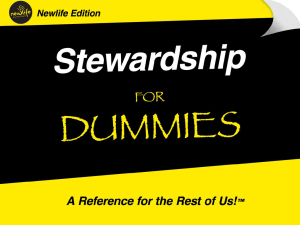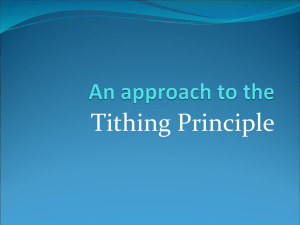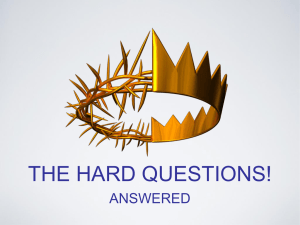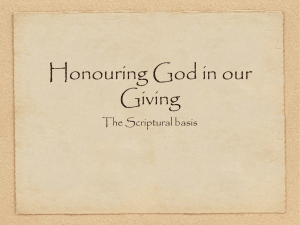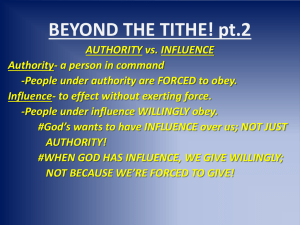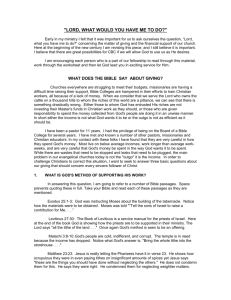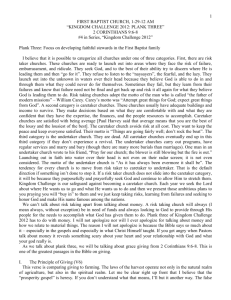Summary: Tithing (No. 161z)
advertisement
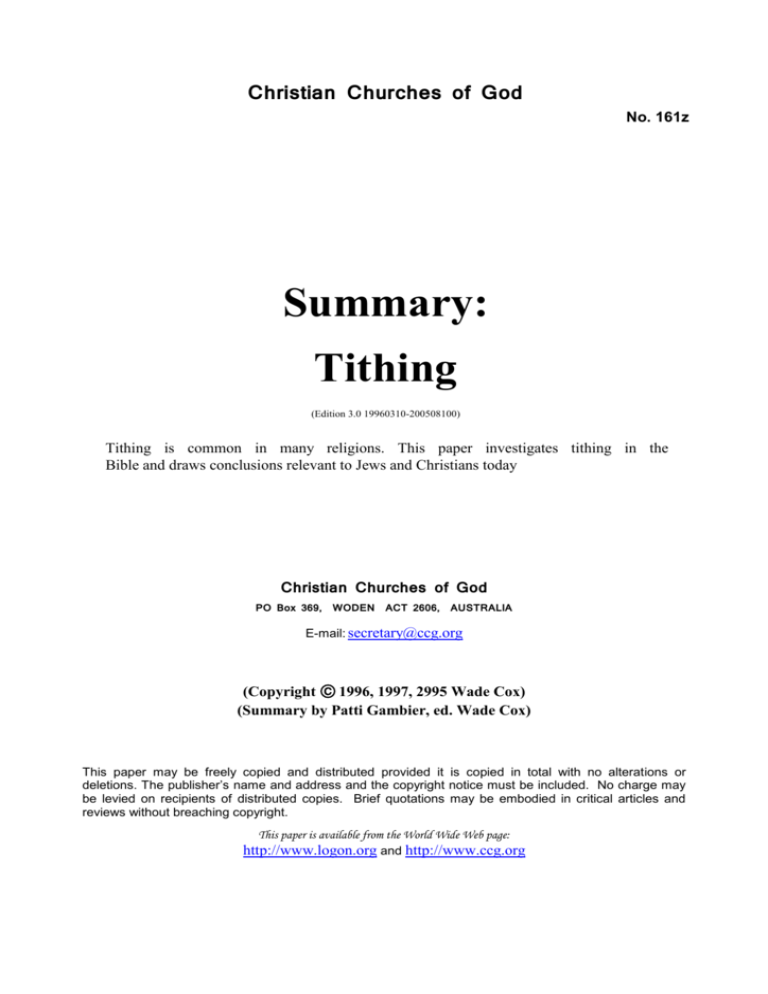
Christian Churches of God No. 161z Summary: Tithing (Edition 3.0 19960310-200508100) Tithing is common in many religions. This paper investigates tithing in the Bible and draws conclusions relevant to Jews and Christians today Christian Churches of God PO Box 369, WODEN ACT 2606, AUSTRALIA E-mail: secretary@ccg.org (Copyright 1996, 1997, 2995 Wade Cox) (Summary by Patti Gambier, ed. Wade Cox) This paper may be freely copied and distributed provided it is copied in total with no alterations or deletions. The publisher’s name and address and the copyright notice must be included. No charge may be levied on recipients of distributed copies. Brief quotations may be embodied in critical articles and reviews without breaching copyright. This paper is available from the World Wide Web page: http://www.logon.org and http://www.ccg.org Page 2 Summary: Tithing Tithing The law of tithing does not stand in isolation. It is essential to the faith and to the elect, and is one of the signs of the elect. The Great Commandment (Deut. 6:5) was central to the whole law, which appended from that commandment (Mat. 22:34-40; Mk. 12:28-34; Lk. 10:25-28). Israel was selected and set apart as God’s own nation. They accepted the terms of the Covenant as presented by God, and He gave them signs to show their peculiar status amongst the heathen nations. These signs included circumcision, the Passover, and the Sabbath (Ex. 20:8,10,11; Deut. 5:12; Ex.31:12-14). The Passover with the Feast of Unleavened Bread was a seal (Ex.13:9,16; Deut. 6:8) and His redemption of Israel (Deut. 6:10). This redemption extends to all those in Christ (Rom. 9:6; 11:25-26). The redemption of the firstborn in Israel is reflected in the Lord’s Supper, as part of the Passover/Unleavened Bread Feast. Circumcision was to be of the heart (Deut. 30:6; Jer. 4:4) and was not just physical (Gen. 17:11; Deut. 10:16), but spiritual. The Sabbath was the sign of both physical and spiritual Israel. Thus keeping the Sabbath, without repentance, baptism and receiving the Holy Spirit, and acknowledging Christ’s death as the means of our redemption, does not give one eternal life in the first resurrection There must be worship and knowledge of the One True God (Jn. 17:3; 1Jn. 5:20). Christ had to die in order to redeem the creation, thus blood is the symbolism of the extreme gift. The taking of life is vested in the authorities, so that by man shall his blood be shed (Gen. 9:6). The wages of sin is death (Rom. 6:23). Blood can only be shed in accordance with God’s word. What God establishes cannot be contradicted by man without sin. The expiation for sin is life for life and cannot be given by man (Ps. 49:7-8; Mk. 8:36-37), but God provides the blood of atonement (Lev. 17:11), which He has done in Messiah. The redemption of Israel, both physical and spiritual, was the redemption of all through the Passover Lamb. Christ was the Passover Lamb, and after His resurrection, He was presented as the Wave Sheaf Offering, or the firstfruits of Israel. He was the firstborn sacrificed as holy to the Lord. Those attending the Lord’s Supper are the converted members of Israel – the spiritual element. All the children and the strangers within the gates, who were the physical component of Israel, undertook the Passover meal. In Exodus 13:1-2 we see the firstborn of man and beast are sanctified to God. The law in this regard is further explained in Exodus 13:11-16; 22:29-30; 34:19-20. The concept of the firstfruits is related to the laws of redemption, and the link is clear. No man can sanctify the firstborn; it is the Lord’s (Lev. 27:26). The nexus of the firstborn and the Feasts and Sabbaths is also clear (Deut. 15:19-20). The firstborn is tied into the tithe system both by redemption and the second tithe (Rom. 11:16). God made the nation of Israel His firstborn (Ex. 4:22-23). Israel is the firstborn of all nations and the Covenant relates to Israel as the firstfruits of the nations, and all will eventually be joined to Israel. God connects His right to Israel’s firstborn with the slaying of Egypt’s firstborn (Num. 8:16-17). Numbers 8:18 establishes the Levites as the substitute firstborn and specific details Summary: Tithing Page 3 of the substitution are given in Numbers 3:1113, 44-51). The elect alone face the first resurrection and, hence, are the firstborn with Jesus Christ for the millennial system. third year, when the second tithe is given to the poor as third tithe, for attendance at the Feasts. Provision also must be made in the seventh year. In Numbers 18:15-17 we see that the firstlings cannot be redeemed and constitute part of the second tithe according to Deuteronomy 14:23, 15:19-22. There is a temple Tax, which is a specific levy for Atonement (Ex. 30:11-16). This tax has been paid by our Saviour with His blood. The first tithe is dedicated to the priesthood and the second tithe is dedicated to the individual for participation in the Feasts. The third tithe is to enable the less fortunate to attend the Feasts and to provide for their welfare. Deuteronomy 14:22.23 covers the second tithe, which becomes, in effect, the third tithe in the third year of the seven-year period within the Jubilee system. In this present predominantly cash and wages society, one tenth of the net amount after expenses for living is paid to the regional office of the Church, who send a tithe of this tithe to the World Conference office. This is the principle covered in Numbers 18:26, and we see from Nehemiah 10:37-38 this was a specific direction for an administrative system. The following application. explains the transfer in The priesthood that preceded the Levitical, and also succeeded it, was that of Melchizedek (Gen. 14:18-20). Abraham tithed to Melchizedek, and that included all the progeny within his loins. Jesus Christ (Ps. 110:4) is High Priest of the Order of Melchizedek (Heb. 7:17). In Luke 10:1,17 Christ transferred the authority from the Sanhedrin to the Church. There was no tithe in the seventh year, as there was no planting in that year (Lev. 25:1-7, Ex. 23:10-11). Debts are forgiven in the Sabbath and Jubilee years (Deut. 15:1-3), and the Law is also read in those years (Deut. 31:9-13; Neh. 8:1-18). However, offerings for the continuation of the work of the Church are acceptable, and necessary. Provision also has to be made in the The Prince’s Levy of Ezekiel 45:13-17 is for the specific purpose of providing the offerings at the Feasts, New Moon and the Sabbaths. There are only three times in the year that freewill offerings are required. These three times are tied to the three harvests of God – Messiah as Wave Sheaf, the elect of the First Resurrection (the wheat harvest at Pentecost) and the general harvest of the world at Tabernacles (Deut. 16:16-17; Ex. 23:17-19). These offerings are to be gathered on arrival at the commencement of each of the Feasts. The tithe is of the net wage free of costs. The calculation of the costs rests with the individual and his relationship with God. Withholding tithes is a serious matter, and is robbing God (Mal. 3:6-18). No person can be part of the elect and not comply with the tithe laws. It is a sign of the return to God in restoration. The last Jubilee year was 1977. 2008 is the next year that second tithe is given as third tithe. 2012 is the next Sabbath year. 2027 is the next Jubilee year. No person or church can establish a system, which limits the system that God decreed in any way (Rom. 1:18-19). Tithing is part of the Covenant relationship with God and a sign that the individual has returned to God and is part of His law-order. Withholding tithes is stripping one’s self of the inheritance and de-sanctifying one’s family.
